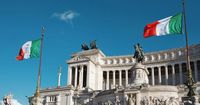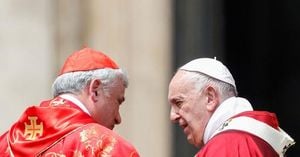Italy finds itself in a moment of reflection and remembrance as it celebrates the 80th anniversary of Liberation Day, a pivotal moment in its history that marks the end of the fascist regime and Nazi occupation. On April 25, 2025, Italians across the nation gather to honor the sacrifices made during World War II, while also grappling with the recent death of Pope Francis, which has cast a shadow over the festivities.
April 25, 1945, is etched in the annals of Italian history as the day when the National Liberation Committee of Northern Italy (CLNAI) declared a general insurrection against the German occupation and the Italian Social Republic. This uprising was the culmination of a long and arduous struggle that began after Italy signed the armistice with the Allies on September 8, 1943. Milan emerged as the heart of this insurrection, where citizens united in a powerful show of resistance against oppression.
The events of that fateful day were not spontaneous; they were the result of years of organized resistance. The CLNAI assumed civil and military power “in the name of the Italian people,” and the Nazi-Fascist command received a clear ultimatum: "Surrender or perish!" The liberation of key cities began with Bologna on April 21, followed by Genoa on April 23, and culminated in the liberation of Turin and Venice on April 28. The definitive surrender of German troops in Italy was formalized on April 29, 1945, and became effective on May 2.
As the country celebrates this historic milestone, the atmosphere is tempered by the national mourning period for Pope Francis, who passed away on April 21, 2025, at the age of 88. The Italian government has called for a five-day mourning period, urging citizens to commemorate Liberation Day “with sobriety.” This directive has sparked debate, as many feel it conflicts with the celebratory spirit of the day.
President Sergio Mattarella is set to lead the official ceremonies, including a tribute to the Unknown Soldier at the Altar of the Fatherland in Rome. In Milan, a procession will start at 2:30 PM from Porta Venezia, culminating at Piazza Duomo, where representatives from various sectors of society will address the crowd. The official poster for this year’s event, titled "Long Live Liberation!", was designed by inmates of the Artemisia Laboratory in Bollate prison, symbolizing a commitment to freedom and social justice.
Traditionally, Liberation Day is marked by public demonstrations, official speeches, and commemorative ceremonies throughout Italy. In Rome, the day will begin with a tribute to the Fosse Ardeatine, a significant site of remembrance for those who lost their lives during the resistance. A Liberation March will weave through neighborhoods that played vital roles in the fight against fascism, while in the San Lorenzo district, the “Festa della Resistenza” will feature over 80 free events, including concerts and exhibitions.
This year, however, some local authorities are scaling back or even canceling events. In Romano di Lombardia, officials have drawn criticism for banning the singing of "Bella Ciao," the iconic anthem of the Italian Resistance, during the start of their Liberation Day procession. The town’s mayor, Paolo Patelli, from the hard-right League party, stated that no musical performances would be permitted except for solemn pieces. This move has been interpreted as part of a broader trend of diminishing the significance of Liberation Day in light of the mourning period.
Despite these controversies, the essence of Liberation Day remains intact. It serves as a reminder of the values that underpin the Italian Republic—freedom, equality, solidarity, and peace. As the Anpi (National Association of Italian Partisans) emphasizes, April 25 is not just a day of commemoration but a call to civil responsibility. The Italian Constitution, crafted from the sacrifices of resistance fighters, continues to guide the nation in its pursuit of fundamental rights.
The celebration of Liberation Day also comes with a culinary tradition. Many families prepare a "grigliata," Italy's version of a barbecue, featuring grilled meats and vegetables, which they enjoy in parks or at home. This communal meal embodies the spirit of togetherness that characterizes the holiday.
As Italy observes this significant anniversary, it is essential to reflect on the lessons of the past. The struggles faced by those who fought against fascism remind contemporary Italians of the importance of vigilance in protecting democracy. The memory of those who sacrificed their lives for freedom serves as a guiding light, urging citizens to remain active participants in their democracy.
In this context, the 80th anniversary of Liberation Day is not merely a celebration of historical events; it is a moment for Italians to reaffirm their commitment to the values that have shaped their nation. It is a day to honor the legacy of the resistance while acknowledging the ongoing challenges posed by inequalities and authoritarian tendencies in society.
As the celebrations unfold across Italy, the hope is that the memory of April 25, 1945, will inspire a renewed dedication to the principles of freedom and justice. The call to action is clear: to defend the Constitution, promote peace, and combat hatred and indifference. In doing so, Italians honor the sacrifices of their forebears and pave the way for a brighter future.




